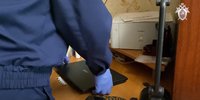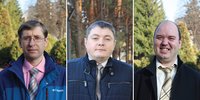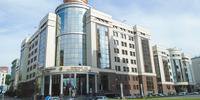The Case of Klyuchnikov and Others in Nizhnekamsk
Filter
- #
The Investigative Committee of the Russian Federation for the Republic of Tatarstan initiates criminal case No. 12002920022000071 under Part 1 and Part 2 of Article 282.2 of the Criminal Code of the Russian Federation against unidentified persons.
- #
In Nizhnekamsk, FSB officers and riot policemen armed with assault rifles raided 12 apartments where believers and their families live. During the searches, law enforcers seize electronic devices, passports, bank cards and personal records. 12 people, including 3 women, are being interrogated.
- #
Nizamov, Senior Investigator of the First Department for Investigation of Particularly Important Cases of the Investigative Directorate of the Investigative Committee of Russia, decides to choose a recognizance not to leave as a preventive measure for Dmitry Yarchak, Stanislav Klyuchnikov and Denis Filatov. They are suspected of organizing the activities of an extremist organization and participating in it.
- #
The investigator for especially important cases of the first department of the Investigative Directorate of the Investigative Committee of the Russian Federation in the Republic of Tatarstan, A. A. Giniyatullin, attracts Stanislav Klyuchnikov, Denis Filatov and Dmitry Yarchak as defendants.
The investigation groundlessly interprets the conversations of believers on religious topics with their fellow believers and friends, including their communication via video link using the Zoom program, as "violation of the right to freedom and independence of the human person, destruction of the foundations of the constitutional system of the Russian Federation by rejecting state power and refusing to fulfill the constitutional duties of citizens of the Russian Federation, destruction of existing family and kinship relations, contributing to the deterioration of physical and mental health."
- #
The Investigative Department of the Investigative Committee for Tatarstan announces the transfer of a criminal case against Denis Filatov, Stanislav Klyuchnikov and Dmitry Yarchak to the Nizhnekamsk City Court of the Republic of Tatarstan.
- #
The case is submitted to the Nizhnekamsk City Court. It is appointed to Judge Sergei Kamenov.
- #
Hearings in the criminal case against Stanislav Klyuchnikov, Denis Filatov and Dmitry Yarchak begin.
Judge Sergei Kamenov rejects the motion of the defense for the publicity of the trial and the admission of listeners, as well as the motion for the announcement of the indictment in its entirety.
Each believer speaks with an attitude to the accusation. Stanislav Klyuchnikov declares that he was only exercising his constitutional right to practice his religion. He says: "I am actually accused of believing in God, talking to others about the Bible, sharing my beliefs with them, praying to Jehovah God, singing songs of praise to him [...] My religion... is based on love, not hatred, enmity and extremism."
Denis Filatov cites similar arguments in his defense: "The episodes of participation in worship services imputed to me, cited in the indictment, can only indicate the exercise of the right to profess one's religion and use methods of expressing faith that were not prohibited." The believer draws the court's attention to the fact that the indictment does not contain any facts of his illegal activities.
Dmitry Yarchak, like the rest of the accused, pleaded not guilty and said: "I am essentially accused of believing in God and remaining one of Jehovah's Witnesses. [...] None of the actions imputed to me, listed today by the prosecution, is prohibited by the Criminal Code of the Russian Federation as a socially dangerous act. On the contrary, they are guaranteed by the Constitution of the Russian Federation as the fundamental rights and freedoms of a person that belong to him from birth.
- #
Stanislav Klyuchnikov files a motion to waive an appointed lawyer in favor of an agreement lawyer. The court refuses.
- #
There is a support group of 12 people outside the courthouse.
The court continues to prevent the entry of a lawyer into the case under the agreement for Stanislav Klyuchnikov.
Prosecution witnesses are being interrogated, one of whom states that during the search he "was led at gunpoint, he testified while in a state of severe stress, and I don't remember what he was talking about." The man uses Article 51 of the Constitution of the Russian Federation. The court shall hear his affidavit.
Judge Sergei Kamenov satisfies the defense's motion for the publicity of subsequent hearings and the admission of listeners. At the request of the defendants, he also gives explanations regarding their measure of restraint: believers can move freely within the Nizhnekamsk district, and travel to other territories with the permission of the investigator.
- #
The questioning of prosecution witnesses is ongoing. The man claims that during the search, he was laid face down on the floor, and then kept for about 13 hours in the Investigative Committee and the Ministry of Internal Affairs. According to him, due to the stress experienced, he signed the interrogation protocol without reading. The witness comments on the written testimony: "I hear half of them for the first time and I don't even know the words of some of them that are written there."
- #
Another of the prosecution witnesses testifies in court. They relate to the period before 2017, when the decision of the Supreme Court of the Russian Federation was made. He explains to the court that he gave untrue written statements under pressure and threats from the security forces who were present during his interrogation.
- #
The questioning of prosecution witnesses is ongoing. The woman refuses the testimony she gave at the investigation stage. She states that she was intimidated by the interrogators and was immediately offered ready-made answers to the questions posed. After reading the interrogation protocol, the witness explains that she could not have said that. In her opinion, some of the testimony was taken from the testimony of her husband, who was a former Jehovah's Witness.
The second witness consistently, both at the stage of pre-trial investigation and at trial, uses Article 51 of the Constitution of the Russian Federation.
- #
"Everything that has to do with the name 'Jehovah's Witnesses' is forbidden," Detective Shcherbakov expresses this opinion in his testimony. He also believes that the 2017 Supreme Court decision banned followers of this religion from believing, preaching, and gathering for worship. When asked what is the difference between the legal terms "religious organization", "religious group" and "international organization of Jehovah's Witnesses", he says that for him there is no difference.
In his testimony, the next witness refutes the prosecutor's arguments regarding extremism on the part of the defendants. She points out that in the record of her interrogation, the investigator arbitrarily wrote words that she did not pronounce.
10 people are allowed to attend the hearing.
- #
A prosecution witness is being questioned. The woman says that she and her son gave preliminary testimony to the investigator at home, although the protocol indicates the office of the Ministry of Internal Affairs. Also, the time of interrogation does not coincide. The lawyer submits a petition that this protocol was drawn up in violation and asks to exclude it from the evidence.
The prosecutor declares the announcement of the protocol of the deceased son of the witness, to which the defense objects, since violations were revealed in the document. However, the judge grants the prosecutor's request.
- #
A woman is being interrogated in court, who says that she is on friendly terms with the defendants. She also briefly mentions her religious views: "When I began to study the Bible with Jehovah's Witnesses, I saw what a useful book it was. Before that, I wanted to get a divorce, but thanks to the Bible, I saved my marriage. My husband always encouraged me to attend worship services because he saw how I began to change for the better because of the Bible."
- #
The court is questioning the last unclassified witness for the prosecution, a woman who attended Jehovah's Witnesses services before 2012. She talks about the canonical structure of the religion of Jehovah's Witnesses and says that it is based on the Bible. She also confirms that she has never experienced any psychological pressure or humiliation from believers, and has stopped attending services of her own free will. The witness also says that the investigator fraudulently brought her in for preliminary interrogation and obtained testimony from her.
- #
A secret witness is being interrogated, who in this case acts under the pseudonym "Khabdrakhmanov Nail Minsagitovich". According to the defense, the prosecutor's office repeatedly invited him under various pseudonyms to hearings on the case of other believers in Tatarstan.
After interrogating the witness, the defendant Dmitry Yarchak makes a statement about the perjury of "Khabdrakhmanov" against the believers.
Judge Sergei Kamenov removes most of the questions of the defense. The lawyer objects to the actions of the judge.
- #
The prosecution continues to read out transcripts of audio recordings from Dmitry Yarchak's apartment: meetings of believers, conversations about the Bible, and more.
One of the defendants asks the state prosecutor to pronounce the name of God, Jehovah, in accordance with the rules of the Russian language, explaining that the distorted pronunciation hurts his religious feelings. The prosecutor listens to the request and tries to put the emphasis correctly.
- #
Material evidence is examined: notebooks with personal notes, printouts of publications on biblical topics. The prosecutor classifies them as evidence of guilt, not taking into account that the religious teachings of Jehovah's Witnesses are not prohibited in Russia. He tries to date these records to see if they belong to the sane period.
- #
The Court reviews fragments of films made by Jehovah's Witnesses, in which the statements of scientists on the issues of bloodless treatment are cited. They draw attention to the fact that Jehovah's Witnesses do not refuse treatment, but choose the best, modern methods.
- #
The study of material evidence — biblical literature and films — continues.
The defense begins to present its evidence based on the materials of the case, citing excerpts from the decision of the ECHR, which fully exonerated Jehovah's Witnesses in Russia.
- #
The defense finishes presenting its evidence from the volumes of the case and quotes excerpts from the book by religious scholar Sergei Ivanenko "About People Who Never Part with the Bible."
The lawyer submits petitions for the inclusion of 4 opinions proving that the New World Translation published by Jehovah's Witnesses is the Bible, and the decisions of the ECHR in the case of LRO Taganrog and Others v. Russia. The court refuses.
- #
Defense witnesses are being questioned. Dmitry Yarchak's mother performs. She does not share her son's religious beliefs, but says that studying the Bible changed him for the better and helped him create a strong family.
The mother of the secret witness "Habdrakhmanov" is being interrogated. She says that her son was friends with Dmitry Yarchak as a child, they began to get acquainted with the Bible together, and now "Habdrakhmanov" dislikes all Jehovah's Witnesses and files lawsuits them, including her. - #
Defendants Filatov, Klyuchnikov and Yarchak testify to the court. One of them explains that, while remaining believers, they did not continue the activities of the liquidated legal entity, but exercised their right to freedom of conscience, since the court did not prohibit the religion of Jehovah's Witnesses. He gives an example: "If you liquidate a garden association, this will not limit its former members in the ability to continue gardening."
- #
The prosecutor requests the disclosure of the protocols of the confrontation of the witness who did not appear with the defendants. The court rejects the petition.
- #
After a brief examination of the prosecution witness, the court proceeds to the pleadings of the parties. The prosecutor asks each defendant for 7 years in a penal colony and 2 years of restrictions after serving his sentence.
In his speech, the prosecutor refers to a comprehensive forensic psychological, linguistic and religious examination. The defense claims that this examination was not announced in court. The lawyer also draws attention to the fact that the prosecution did not provide concrete evidence of the guilt of the defendants and that the prosecutor substitutes concepts, accusing believers of continuing the activities of the liquidated legal entity.
- #
Lawyers of Denis Filatov and Stanislav Klyuchnikov speak in the debate. The prosecutor reads out the comprehensive examination, which he referred to in the debate. According to it, the recordings presented to the specialists contain calls for hatred and enmity on the part of the accused. However, the defense believes that the examination was carried out with serious violations. At the request of lawyers, the hearings are postponed to August 10.
- #
The defense petitions to summon the specialists who conducted the comprehensive examination to the court. The defense draws the court's attention to the fact that it was performed with violations.
The defense argues to the court that the questions posed to specialists go beyond their special knowledge. Thus, in the materials of the criminal case there are no documents confirming that specialists have received higher education and the necessary training to perform state forensic examinations. In addition, some of the questions posed to the experts relate to the field of religion and psychology. "None of the experts has the proper qualifications," the defense notes. Despite this, the court refuses to satisfy the petition.
The debate continues. The prosecutor reads the indictment again, but with minor additions. He asks to recover court costs from the defendants and leave material evidence in the storage room "in connection with new criminal cases."
- #
The last word of the defendant Stanislav Klyuchnikov in Nizhnekamsk - #
The last word of the defendant Dmitry Yarchak in Nizhnekamsk - #


